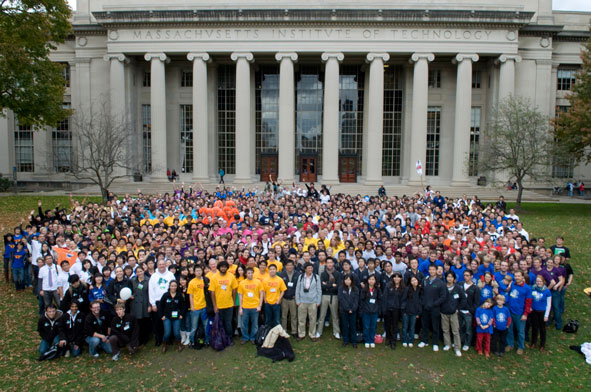Team:TU Delft/Home/competition
From 2010.igem.org
The iGEM Competition
The International Genetically Engineered Machines (iGEM) competition is annually held at the Massachusetts Institute of Technology (MIT) in the field of Synthetic Biology. Since 2004, this competition encourages undergraduate teams from all over the world to develop a project that intertwines the principles of Biology and Engineering. The competition not only determines the worth of projects solely based on biological merit, but also requires teams to examine their project as a whole. This includes aspects such as modelling of genetic circuits, marketing the project and educating the public about iGEM and Synthetic Biology.Randy Rettberg, the director of iGEM, once described the main question as follows: "Can simple biological systems be built from standard, interchangeable parts and operated in living cells? Or is biology just too complicated to be engineered in this way?" The iGEM-approach to answer that question is to actually try to engineer biological systems with a proper function. To this end, more than 100 interdisciplinary student teams from all over the world, mainly consisting of undergraduate students in biology, biochemistry, engineering, informatics and mathematics, carry out different projects during the summer.
These projects reach from medical applications, i.e. genetically modified bacteria used in cancer-treatment to environmental and manufacturing projects, i.e. the construction of a watch-like counter consisting of living cells.
BioBricks
Biological parts can be well defined and characterized in the same way as electric or mechanical components (standardization). These basic biological building blocks, the “bio-brick”, can then be used to design devices and systems that are more and more complex (hierarchy). The designer of a bio-system does not need to worry about all the details of the individual devices, and the designer of a bio-device does not need to know all the details of the single parts (decoupling): all that is required is to fish out into a repository the most suitable building blocks (parts or devices) required for the design at hand.
A database of bio-bricks has been actually initiated few years ago, and is currently maintained by the Massachusetts Institute of Technology (Registry of Standard Biological Parts). The existence of such a repository has fostered, over the last few years, the development of an incredible variety of different bio-devices ranging from sensors, logical circuits, computational devices, oscillators, supply chains of bacterial colonies etc.
Each year all teams participating in the iGEM competition get a selection of commonly used parts. These are send to the teams in plates. In this way well characterized parts from previous years are reused in the next competition.Continue Reading
 "
"


